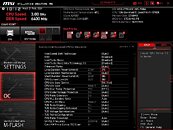- Joined
- Oct 9, 2007
- Messages
- 47,674 (7.43/day)
- Location
- Dublin, Ireland
| System Name | RBMK-1000 |
|---|---|
| Processor | AMD Ryzen 7 5700G |
| Motherboard | Gigabyte B550 AORUS Elite V2 |
| Cooling | DeepCool Gammax L240 V2 |
| Memory | 2x 16GB DDR4-3200 |
| Video Card(s) | Galax RTX 4070 Ti EX |
| Storage | Samsung 990 1TB |
| Display(s) | BenQ 1440p 60 Hz 27-inch |
| Case | Corsair Carbide 100R |
| Audio Device(s) | ASUS SupremeFX S1220A |
| Power Supply | Cooler Master MWE Gold 650W |
| Mouse | ASUS ROG Strix Impact |
| Keyboard | Gamdias Hermes E2 |
| Software | Windows 11 Pro |
Users of Intel's 13th Gen unlocked K-series processors such as Core i9-13900K, i7-13700K, are reporting stability issues when gaming even at stock clock-speeds. Hassan Mujtaba of Wccftech and Tom's Hardware have isolated the issues to power limit unlocks. Most Z690 and Z790 chipset motherboards include BIOS-level unlocks for the power limits, particularly the Maximum Turbo Power (interchangeable with PL2). By default, the i9-13900K and i7-13700K come with a PL2 value of 253 W, but you can get the motherboard to unlock this to unlimited, which basically tells the processor that it has 4096 W of power on tap, so not technically a "stock" configuration anymore.
Of course, neither your PSU nor your CPU VRM are capable of delivering 4096 W, and so the processor tends to draw as much power as it needs, to maintain the best possible P-core boost frequencies, before running into thermal limits. At stock frequencies with stock boost bins, unlocked power limits can drive the power draw of i9-13900K as far high as 373 W under a multithreaded load, in our testing, when compared to 283 W with the power limits in place. It turns out, that unlocking the power limits can come with long-term costs, besides the literal cost of electricity—the processor's stability with gaming workloads can degrade with certain hardware combos and settings.

Wccftech's Hassan Mujtaba has a novel fix for this—to undervolt the processor. In his experience, undervolting the processor and restoring the stock power limits in the motherboard BIOS settings restored gaming stability. Meanwhile, Tom's Hardware suggests a slightly different approach besides restoring power limits—to reduce the P-core boost multiplier by 2.0x (i.e. reducing the maximum boost frequency by 200 MHz). Both these approaches are claimed to restore gaming performance stability for the i9-13900K and i7-13700K. Although there are no confirmed sightings of the issue in the wild for the newer 14th Gen chips, it stands to reason that even the 14th Gen i9-14900K and i7-14700K could be affected by this issue. We still don't know why it doesn't affect the 12th Gen chips, since they feature fundamentally the same power design as the 13th- and 14th Gen chips.
View at TechPowerUp Main Site | Source
Of course, neither your PSU nor your CPU VRM are capable of delivering 4096 W, and so the processor tends to draw as much power as it needs, to maintain the best possible P-core boost frequencies, before running into thermal limits. At stock frequencies with stock boost bins, unlocked power limits can drive the power draw of i9-13900K as far high as 373 W under a multithreaded load, in our testing, when compared to 283 W with the power limits in place. It turns out, that unlocking the power limits can come with long-term costs, besides the literal cost of electricity—the processor's stability with gaming workloads can degrade with certain hardware combos and settings.

Wccftech's Hassan Mujtaba has a novel fix for this—to undervolt the processor. In his experience, undervolting the processor and restoring the stock power limits in the motherboard BIOS settings restored gaming stability. Meanwhile, Tom's Hardware suggests a slightly different approach besides restoring power limits—to reduce the P-core boost multiplier by 2.0x (i.e. reducing the maximum boost frequency by 200 MHz). Both these approaches are claimed to restore gaming performance stability for the i9-13900K and i7-13700K. Although there are no confirmed sightings of the issue in the wild for the newer 14th Gen chips, it stands to reason that even the 14th Gen i9-14900K and i7-14700K could be affected by this issue. We still don't know why it doesn't affect the 12th Gen chips, since they feature fundamentally the same power design as the 13th- and 14th Gen chips.
View at TechPowerUp Main Site | Source






 Did you read the actual article?
Did you read the actual article?


